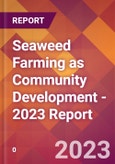This comprehensive report explores the potential of seaweed farming as a sustainable and environmentally friendly alternative to traditional fertilizers, highlighting its potential for community development and economic growth. The report offers an update on the latest advancements in seaweed farming practices and explores the feasibility of using seaweed as a substitute for Russian fertilizer, given the geopolitical context. By examining the economic, environmental, and social benefits of seaweed farming, this report provides valuable insights for policymakers, investors, and community leaders interested in pursuing sustainable agriculture and community development initiatives.
Table of Contents
- Introduction
- Seaweed Cultivation as an Alternative to Traditional Fertilizers
- Update on Seaweed Farming
- Seaweed as a Substitute for Russian Fertilizer
- The Role of Seaweed Farming in Community Development
- Environmental and Social Benefits of Seaweed Farming
- Economic Potential of Seaweed Farming
- Case Studies: Successful Seaweed Farming Initiatives
- Challenges and Opportunities for Seaweed Farming
- Bibliography








